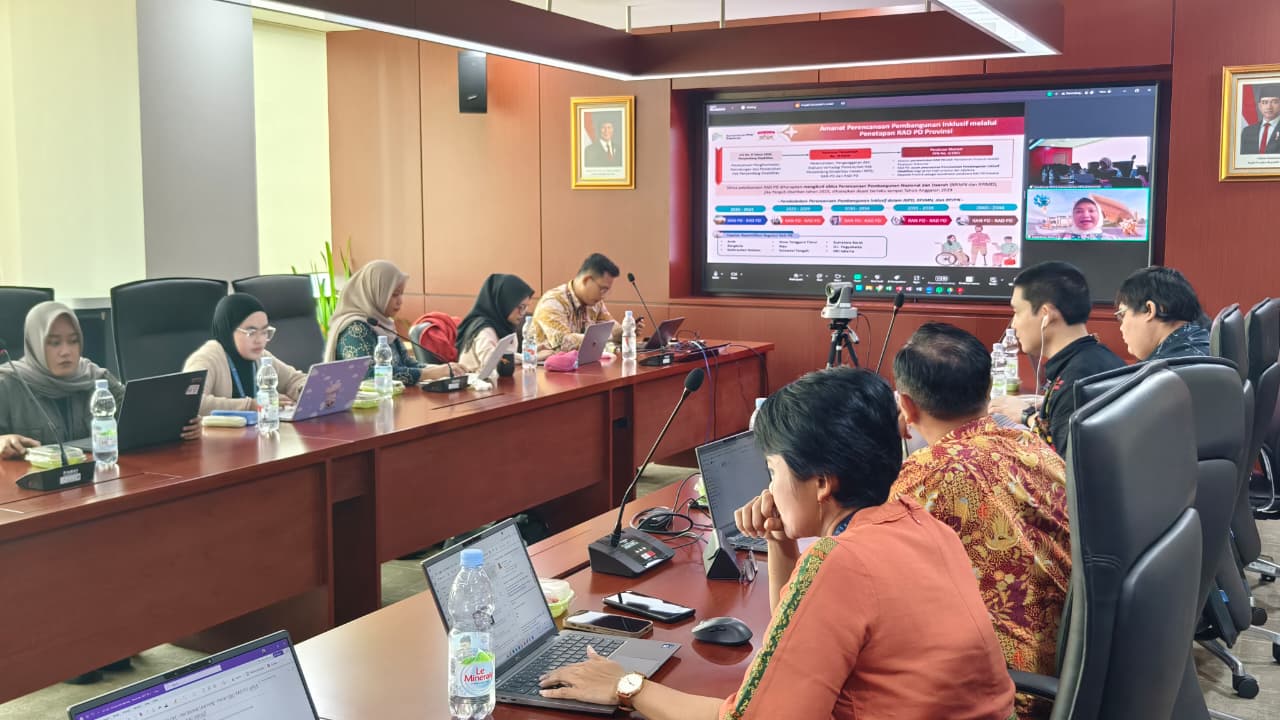Aceh, East Nusa Tenggara, and DKI Jakarta Put Disability Inclusive Development into Action

Inclusive development for persons with disabilities builds on a solid foundation of supportive regulations, equal engagement with organisations for persons with disabilities (OPDis), and the effective use of data and monitoring to guide planning and basic service delivery. These approaches have been implemented and are beginning to show tangible results, as presented by the provinces of East Nusa Tenggara (NTT), Aceh and Special Capital Region of Jakarta (DKI Jakarta) during the Regional Learning Workshop on the Formulation, Implementation and Advancement of Disability Inclusive Regional Development through the Regional Disability Action Plan. The workshop was convened by the Directorate of Population and Social Welfare Planning (PKKS) of the Ministry of National Development Planning at Menara Bappenas in Jakarta on 20 October 2025.
Indonesia’s commitment to disability inclusive development is set out in Law Number 8 of 2016 on Persons with Disabilities and Law Number 19 of 2011 on the ratification of the Convention on the Rights of Persons with Disabilities. These laws establish a human rights-based approach to disability inclusion and recognise persons with disabilities as active participants in development processes.
As a follow up to these laws, the Government issued Government Regulation Number 70 of 2019 on the Planning, Implementation and Evaluation of the Respect, Protection and Fulfilment of the Rights of Persons with Disabilities. This regulation guides the preparation of the National Disability Master Plan (Rencana Induk Penyandang Disabilitas/RIPD) and the National Disability Action Plan (Rencana Aksi Nasional Penyandang Disabilitas/RAN PD). Based on this framework, every province is required to develop a five-year Regional Disability Action Plan (Rencana Aksi Daerah Penyandang Disabilitas/RAD PD) to ensure that regional policies and budgeting processes respond to the needs of persons with disabilities.
Disability Inclusive Development: Policies, Data and Implementation
From NTT, Naftaly S. Huky, Head of the Governance and Human Development Division at Bapperida NTT, shared the province’s progress in issuing three key regulations: Regional Regulation Number 6 of 2023, Governor Regulation Number 48 of 2024 and Governor Regulation Number 2 of 2025. Together, these instruments secure the involvement of OPDis in all stages of regional planning and development. With support from Bapperida, OPDis now understand the planning processes and contribute through a defined role.
Naftaly also noted several challenges in Nusa Tenggara Timur, including gaps in disaggregated data, the underuse of Regsosek and the Integrated Social Welfare Data (DTKS) by both government and OPDis, and disability related budgets that remain spread across regional government offices (Organisasi Perangkat Daerah/OPD) without consolidation.
On behalf of DKI Jakarta, Endiq Yogana of the Provincial Development Planning Office (Bappeda) described how the provincial government has developed a network of 24 OPDis to strengthen collaboration in disability inclusive development. Jakarta has integrated the RAD PD into Governor Decree Number 292 of 2023 on the 2023 to 2026 Regional Development Plan, used the Regional Strategic Activity System as a platform to monitor implementation, and introduced a cross-sector budget tagging system. Endiq noted constraints in translating stakeholder inputs into activities that can be implemented by OPD. He also identified the absence of technical guidance from the national level as a factor that affects program design at the provincial level.
Representing Aceh, Dr. Husnan, Head of the Provincial Development Planning Office, presented the province’s issuance of Governor Regulation Number 53 of 2023 on the 2024 to 2029 RAD PD, which sets the direction for disability inclusive development. The government is also preparing a Governor Regulation to implement the Aceh Disability Qanun, which will strengthen the legal basis for disability rights at the regional level. Husnan highlighted the need to improve cross-sector coordination to expand access to data, education, health services and accessible public facilities. He also noted challenges such as uneven understanding of disability inclusion across regencies/municipalities and the need for a more integrated reporting and evaluation system. Despite these challenges, collaboration between OPD and OPDis, including Children and Youth Disability for Change (CYDC), is already in place and continues to strengthen disability inclusive development in Aceh.
Experiences from OPDis in NTT through Garamin, and in Aceh, through CYDC, show the importance of involving disability communities from the earliest stages of policy formulation. Engagement should follow four principles: collaboration, participation, partnership and mutual trust. Such engagement positions OPDis as equal partners in shaping disability inclusive development. Strengthening policy integration at the regional level is important to ensure that disability rights and needs are reflected in planning, budgeting and public service delivery. The SKALA Program supports this work through evidence-based approaches and the integration of Gender Equality, Disability and Social Inclusion (GEDSI) principles.
Future Directions
The provinces of NTT, Aceh and Jakarta can strengthen disability inclusive development by adopting more coherent regulations, improving disaggregated data and building institutional capacity. Effective implementation of the RAD PD requires better coordination across sectors, integrated monitoring platforms and budgeting mechanisms that respond to the needs of persons with disabilities. Engagement with OPDis throughout planning, implementation and evaluation is essential to ensure that policies reflect the needs of disability communities. Taken together, these efforts position the three provinces to provide national leadership in advancing equitable, inclusive and just development for all people.






